Rapporti ISTISAN 09/49 ISTITUTO SUPERIORE DI SANITÀ Ageing ...
Rapporti ISTISAN 09/49 ISTITUTO SUPERIORE DI SANITÀ Ageing ...
Rapporti ISTISAN 09/49 ISTITUTO SUPERIORE DI SANITÀ Ageing ...
Create successful ePaper yourself
Turn your PDF publications into a flip-book with our unique Google optimized e-Paper software.
<strong>Rapporti</strong> <strong>ISTISAN</strong> <strong>09</strong>/<strong>49</strong><br />
holistic and integrated point of view, the different research contributions given in this field on<br />
the exploitation of personal, physical, cognitive and social resources, functional to the<br />
development of wellbeing and of individual autonomy, even if they do not consider some limits.<br />
One of the critical points to be referred to theoretical models is that they cannot always be<br />
applied in the training intervention of operators working with the elderly. We must consider that<br />
this new approach, oriented to the development of wellbeing is relatively recent (also as regards<br />
its application, it has developed over the last ten years) and that the change from the traditional<br />
medical model to the bio-psychological-social model is still in course. The process of a new<br />
substantial revision of the traditional model is often considered as topical, because of the lack of<br />
suitable methodologies shared by operators. To this a not clear conceptual definition of the<br />
different levels of analysis and intervention is to be added. We are still in the stage of<br />
construction of a virtuous circle which systematically takes into account theoretical studies and<br />
field practice. The most crucial problem is not only a cultural problem, but is linked to the speed<br />
of changes of an age and to the variety of variables intervening and which cannot be always<br />
controlled. We must however underline that the bio-psycho-social model results to be<br />
historically important, above all because it has caused the emergence of the problem of the<br />
complexity of health, giving strength to the many voices emerging from psychology and<br />
sociology besides biology (Bertini, 1999); but such model, beyond “good intentions”, just for<br />
the difficulty deriving from the above said complexity of this field, runs the risk of “becoming<br />
generic”, because instead of an interactive co-evolution of the different levels of behaviour<br />
(biological, psychological and social), we often observe a failed relationship between<br />
dimensions and levels (Romano, 1999).<br />
As regards the evaluation of this model (in terms of adoption of the model itself), it would<br />
seem that today the idea that psyche and body are inseparable and that physical disorders have<br />
an influence on the psyche and vice versa, is widespread. A tendency to underline the dynamic<br />
character of the relationship between individual and environment (underlining the instability of<br />
such relationship) seems to be possible. By the adoption of this model, the influence of<br />
environmental and social factors is further underlined.<br />
“Health” is then intended not only as wellbeing deriving from the good functioning of the<br />
body, but is also the result of the interaction between the environment and the individual. Such<br />
interaction aims at balance and has adaptive purposes. By the term “balance” we want to refer to<br />
the importance which wellbeing, the lack of stress, psychological wellbeing and good<br />
relationships with the others within one’s own personal and evolution condition, have. Personal<br />
inclinations can produce vulnerability to specific environmental factors which cause diseases.<br />
Environmental and personal variables can influence the onset of a disease through physiological<br />
mechanisms. Health outcomes are linked to social support, bad disposition of the individual and<br />
job stress. The subjective perception of a situation as stressing results to be more decisive in<br />
influencing the state of health than the mere exposition to stressing events (Baum & Posluszny,<br />
1999). Theoretical approaches are generally starting to adopt holistic and systemic points of view,<br />
in which the interpretation of individual psychological and interpersonal variables tend to be<br />
interrelated to each other. We should also more deeply study the dynamics of the contexts to<br />
which the elderly belong. We also find a too big fragmentation of individual and contextual<br />
factors of the elderly and an exaggerated medication, even and above all in the international<br />
scientific literature. Unlike Italy, the USA and the European countries like Great Britain, seem to<br />
still emphasise with a marked pragmatic approach, the moment of therapy, the disease and<br />
lifestyles. In this case we see the necessity of carrying out a positive new interpretation of the idea<br />
of the elderly, emphasising not their competencies which undergo a decrease or need to be<br />
developed to foster a good transition to old age, but rather the already owned competencies and<br />
environmental resources, which can represent a trigger factor on which new study models and<br />
38



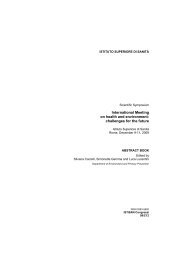
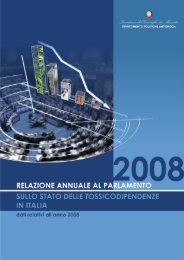
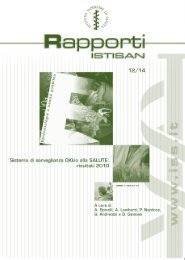
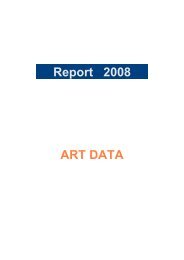
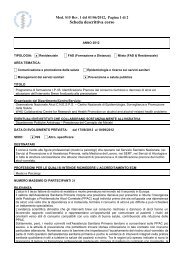
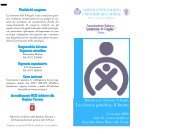
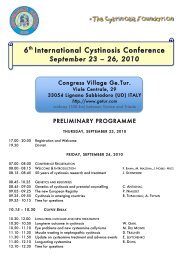
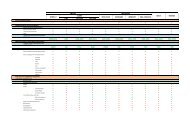
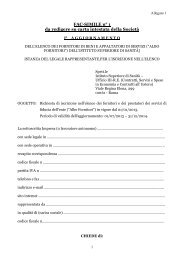
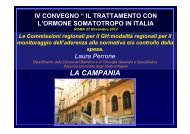
![Emilia Romagna [PDF - 175.10 kbytes]](https://img.yumpu.com/23556597/1/184x260/emilia-romagna-pdf-17510-kbytes.jpg?quality=85)
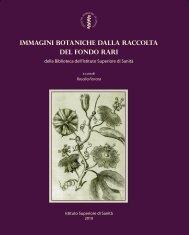
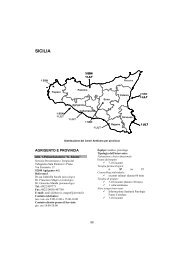
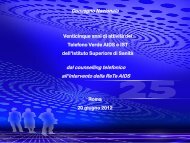
![Istisan Congressi N. 66 (Pag. 1 - 81). [PDF - 2021.12 kbytes] - Istituto ...](https://img.yumpu.com/23556493/1/171x260/istisan-congressi-n-66-pag-1-81-pdf-202112-kbytes-istituto-.jpg?quality=85)